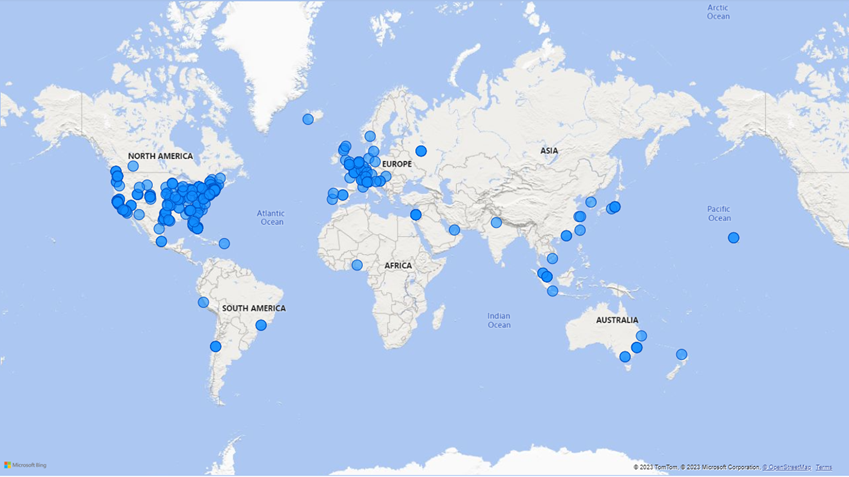
Source from pitchbook; powered by Microsoft Bing Map.
Note: All blue dots are same size just show the location.
Boston’s foodtech landscape has garnered substantial attention from investors, attracting capital from both U.S. and European financial markets, as depicted in the Boston Food Technology Companies Global Capital Map.
Table 1: Global Capital Flow – Top 5 Countries By The Numbers Of Investors
| Country | The number of investors | Percentage |
| United States | 854 | 76.11% |
| United Kingdom | 34 | 3.03% |
| France | 21 | 1.87% |
| Canada | 19 | 1.69% |
| Japan | 12 | 1.07% |
| Other | 182 | 16.22% |
| Total | 1122 | 100.00% |
| Note: Others include 57 investors with unknown locations and 125 from different countries. | ||
According to the latest data as of October 2023, 1122 investors are involved in funding Boston’s food tech companies.
The data indicates that the majority of the capital flowing into these companies originates from investors based in the United States. Approximately 76.11% of the total investments can be attributed to U.S. state-based investors, underscoring the significance of domestic support for this sector.
In addition to the prominent U.S. investors, the report highlights the participation of investors from various other countries. For example, 34 investors from the United Kingdom have shown interest in investing in Boston’s food tech companies. France has also emerged as a significant participant, with 21 investors displaying a keen interest in Boston’s food tech scene. Furthermore, Canada (19) and Japan (12) have also demonstrated notable interest in the innovative food tech firms in Boston.
| Table 2: National Capital Flow – Top 5 States By The Numbers Of Investors | ||
| State | The number of investors | Percentage |
| California | 215 | 25.18% |
| Massachusetts | 201 | 23.54% |
| New York | 128 | 14.99% |
| Illinois | 37 | 4.33% |
| Texas | 30 | 3.51% |
| Others | 243 | 28.45% |
| Total | 854 | 100.00% |
| Note: Others include investors with 4 unknown locations and 239 from various states. | ||
Table 2 focuses on U.S. investor engagement in Boston’s food tech companies. States like California, Massachusetts, and New York have the highest numbers of investors interested in Boston’s food technology.
California, with a notable presence of 215 investors, has shown a strong inclination towards investing in this sector. The total number of investors in Boston’s food tech companies from California accounts for 25.18 percent of the total number of investors.
On the East Coast, Massachusetts itself stands as another pivotal state with a substantial investor footprint in the Boston food tech domain. With 201 investors engaged in this sector, Massachusetts has demonstrated a robust interest in the innovation and growth opportunities within the Boston food tech industry. The number of investors in Boston’s food tech companies in Massachusetts accounts for 23.54 percent of the total number of investors, signifying significant financial support from the investor base in the state itself.
New York also holds a position in the landscape of Boston food tech investments, with 128 investors, accounting for 14.99 percent of the total number of investors.
| Table 3: National Capital Flow – Top 5 States by Aggregate Deal Size | ||
|
State
|
Sum of Deal Size (M)
|
Percent
|
| California | 3580.04 | 36.47% |
| Massachusetts | 1023.94 | 10.43% |
| Florida | 864.3 | 8.80% |
| New York | 858.76 | 8.75% |
| Washington | 679.76 | 6.92% |
California leads the national capital flow with an impressive aggregate deal size of $3,580.04 million, constituting 36.47% of the total. Massachusetts has a substantial deal size in this sector, with a value of 1023.94 million, representing 10.43% of the national capital interested in Boston food technology.
Greater Boston’s standing as a hub for innovation and investment in the food tech industry is underpinned by a robust ecosystem, cutting-edge research, and a flourishing community of startups. As the industry continues to evolve, Boston is poised to remain a driving force, offering unparalleled opportunities for those keen on contributing to and benefiting from the future of food technology.
